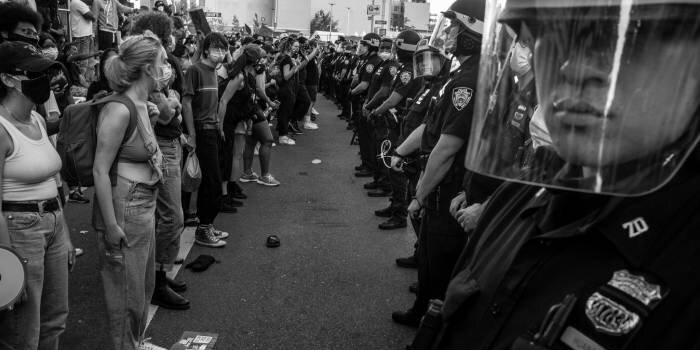
This course critically investigates lawful violence sanctioned and deployed by modern nation states. We pay particular attention to philosophical legitimations, institutional formations, and circulating techniques of state-sanctioned violence. Through an expansive corpus of intellectual work – including journal articles and books, abolitionist manifestoes, prison writings, anti-militarist films, testimonials from sites of war, and political poetry – we analyse police, prisons, armies, border regimes, surveillance technologies, legalised weaponry, paramilitary outfits, private security, militarised occupation, detention centres, artificial intelligence, and more. The relationship between state violence and racial, colonial, imperial hierarchies; gendered and patriarchal orders; and the management of class, capitalism, and late neoliberalism will structure our conversations throughout the term.
The course begins by conceptualising the relationship between state, law, and violence, paying particular attention to a classic definition of the state as a human community that possesses the legitimate monopoly over violence within a defined territory. In this first part of the course, we revisit the philosophical and historical underpinnings that led to the emergence and solidification of the violence-making institutions of the state. This includes a critical interrogation of the figure of the ‘terrorist’, ‘criminal’, ‘traitor’, and others considered legitimate targets of state violence. We also focus on technologies of violence, including prisons, immigrant detention, counterterror confinement, drone warfare, privatised security, surveillance, and the emerging role of artificial intelligence to make “kill lists” and the criminal justice systems more efficient. Finally, we look at grassroots movements including abolitionist, anti-war, anti-racist, and anti-colonial movements in places like Kashmir, the US, Iran, Egypt, Balochistan, South Africa, Hong Kong, Brazil, Palestine, and elsewhere. Throughout the course, students will gain a solid understanding of state violence–and alternative imaginations of political community and justice that fundamentally refigure the place of violence and its relationship to collective life.
The course begins by conceptualising the relationship between state, law, and violence, paying particular attention to a classic definition of the state as a human community that possesses the legitimate monopoly over violence within a defined territory. In this first part of the course, we revisit the philosophical and historical underpinnings that led to the emergence and solidification of the violence-making institutions of the state. This includes a critical interrogation of the figure of the ‘terrorist’, ‘criminal’, ‘traitor’, and others considered legitimate targets of state violence. We also focus on technologies of violence, including prisons, immigrant detention, counterterror confinement, drone warfare, privatised security, surveillance, and the emerging role of artificial intelligence to make “kill lists” and the criminal justice systems more efficient. Finally, we look at grassroots movements including abolitionist, anti-war, anti-racist, and anti-colonial movements in places like Kashmir, the US, Iran, Egypt, Balochistan, South Africa, Hong Kong, Brazil, Palestine, and elsewhere. Throughout the course, students will gain a solid understanding of state violence–and alternative imaginations of political community and justice that fundamentally refigure the place of violence and its relationship to collective life.
